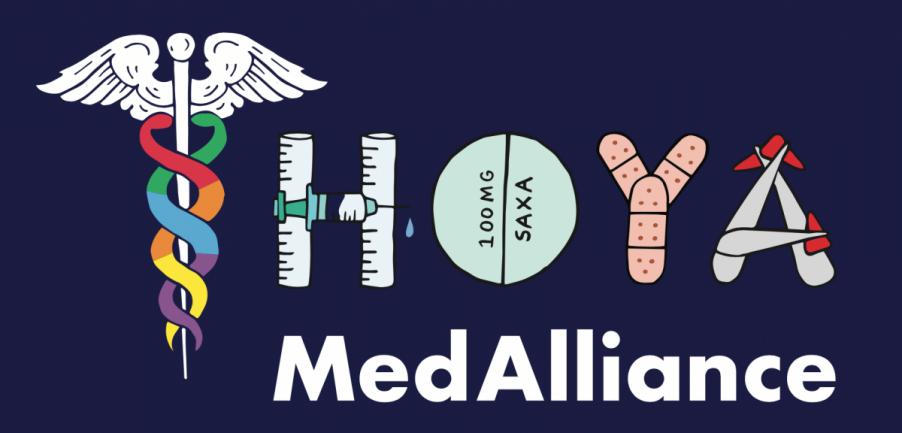Honoring an Advocate for LGBTQ Health Education

Posted in GUMC Stories | Tagged Hoya MedAlliance, LGBTQ, population health
(April 27, 2018) — Recognizing the pivotal role she played in making the human sexuality course at the School of Medicine more inclusive, the Hoya MedAlliance recently honored Andrea Singer, MD, with the Faculty Lambda Award.
Since 2008, the Hoya MedAlliance has provided social, educational, advocacy and service opportunities for LGBTQ students and allies at the School of Medicine, as well as the greater Georgetown and Washington, D.C., communities. Hoya MedAlliance members gave rainbow caduceus pins to graduating fourth-year medical students at the April 19 awards ceremony in the Medical-Dental Building.
Given with support from the Office of Diversity and Inclusion and the Office of Student Affairs, the Lambda Award honors a faculty member at the School of Medicine for their enduring commitment to Georgetown’s LGBTQ community. Michael Plankey, PhD, associate professor of medicine and 2017 Lambda Award recipient, praised Singer at the event and shared the story about how they met.
After Plankey joined the faculty at the School of Medicine 12 years ago, he attended a class on human sexuality, then reached out to Singer to discuss ways to make it better. “I wasn’t sure what I was doing here, whether I was going to be successful, whether I was going to make an impact,” he said. “She was an ally to me, a mentor.”
“I feel very privileged to be able to teach at an institution where this is supported and we can really do the right things,” Singer said. “And in the current climate and everywhere, this is more important than ever.”
Creating a more inclusive curriculum
In addition to her roles as chief of the women’s primary care division and director of bone densitometry in the department of obstetrics and gynecology at MedStar Georgetown University Hospital, Singer serves as associate professor of medicine and human sexuality course director at the School of Medicine.
While she felt unprepared when Stephen Ray Mitchell, MD, MBA, dean of medical education at the School of Medicine asked her to take over the human sexuality course, Singer has integrated LGBTQ clinical care and cultural competency into the curriculum. The course includes a panel of LGBTQ health experts, LGBTQ health small groups and a standardized patient exam (OSCE) focused on human sexuality.
“When you look at sexual health curricula, particularly LGBTQ health across the country, there haven’t until recently been any standards from AAMC or anywhere else, so there’s huge variation in terms of what curriculum do,” Singer said. “And going to a lot of national meetings and talking with other educators, we are probably one of the best in the country in terms of curriculum and in terms of what we do.”
Singer thanked School of Medicine faculty who contribute to the LGBTQ health part of the human sexuality course formally and informally. “They come and share their personal stories as providers and as patients,” she said. “I think that really resonates and makes a big difference for the students.”
Students don’t always appreciate the importance of the lessons they learn in the human sexuality course until they realize that they are prepared to treat diverse patients when they start their clinical work. “What we’ve been trying to focus on is making sure that we create doctors who know how to deliver the best care to everyone and also know how to recognize their own thoughts, opinions, biases, and also take care of themselves as providers,” Singer said. “I think that’s really important as well.”
Kat Zambon
GUMC Communications
